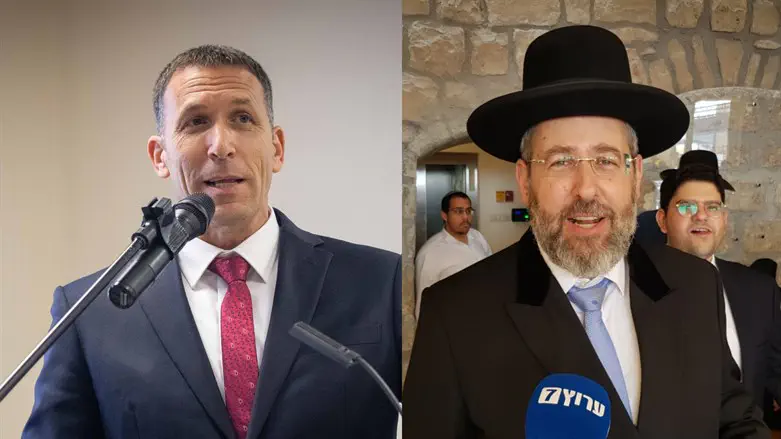
In the ongoing controversy on conversion reform, Ashkenazi Chief Rabbi David Lau has launched another attack on Religious Affairs Minister Matan Kahana, insisting that even if Kahana's reform is passed by the Knesset, only the Chief Rabbinate will determine "who is a Jew."
In an interview that will be published in full in Friday's edition of Israel Hayom, Rabbi Lau stressed: "With all due respect, even if the Knesset establishes that a person with a 43-degree fever is healthy, it won't make it true; even if they pass legislation that says you don't need mortar to build a house, that's not going to happen. Likewise with conversion: The Knesset is not going to determine who is a Jew. A Jew is someone who takes upon himself the 'ol mitzvot,' who commits to Torah observance, and who connects himself to the Jewish People."
Rabbi Lau continued: "A child born in the United States is an American. Someone who wants US citizenship has to go through a protracted process in order to obtain it. A person who is born on a kibbutz is automatically a kibbutznik; anyone else who wasn't born there has to comply with a variety of conditions in order to be accepted. The Jewish People is no less a significant 'institution' than the United States or a kibbutz," Rabbi Lau added.
"For generations, the conditions for joining have been the same - halachic conditions [based on Jewish law], and there's one address for those which is the Chief Rabbinate. If people are upset about assimilation, they should be changing the Law of Return. According to data from the Interior Ministry, a substantial majority of those immigrating to Israel under the Law of Return are not Jews, so what is the point of bringing them here and then complaining that there's a problem? This should be the first thing to be fixed, rather than seeking to change a law whose basis is entirely grounded in halachah," Rabbi Lau stressed.
The interview also touched on the sensitive issue of divorces, and Rabbi Lau explained the position of the Chief Rabbinate, in his capacity as President of the Beit Din Hagadol, the Supreme Rabbinical Court, while noting the criticism of feminist groups and others who allege that the country's rabbinical courts do not do enough to address the issue of those who refuse to grant a halachic divorce (get).
"There is a clear injustice being committed in such cases," Rabbi Lau said, "and religious court judges invest an enormous amount of time in their efforts to resolve these questions. We do everything possible to exhaust all the options, but I cannot accept the notion [increasingly adopted of late by progressive elements] that it is permissible to invalidate a wedding after the event with such ease. When a couple marries and lives together for years and only later comes to beit din with problems, it is simply not possible to argue that those problems existed from the very beginning. How can one argue with any justification that the wedding was no wedding in such cases?
"I am well aware of the underlying agenda of those who are pushing for this tactic to be widely used," Rabbi Lau noted. "They most certainly have ulterior motives. When you see this played out in practice, with a female lawyer in beit din standing up to make a speech and presenting such arguments, the judges tell her: You're not helping your client by putting forward such an argument - in fact, you're actually damaging her case. But she takes no notice, because it's not her client she cares about, only the speech she's making. This is tragic," Rabbi Lau says, "because they are simply exploiting the distress of these women for their own ends."
